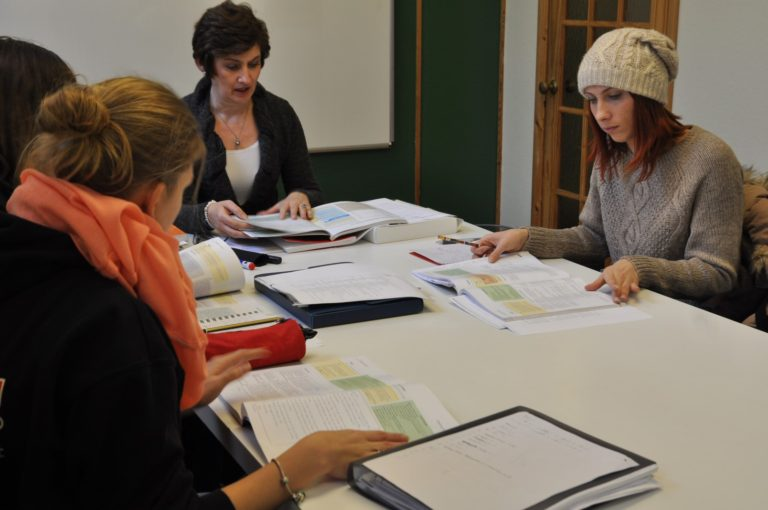… and why you can’t use them!
It goes without saying that we’ve heard every excuse in the book in the last 28 years… and we’ve overcome every single one of them.
At the Marlow Language Centre, we come across the same reservations time and time again, but the trick to surmounting those mental blocks is to see those “reasons” for what they are – unfounded excuses that you don’t have to be guided by!
Want to know if
your favourite excuse is on our list? These are the five most common reasons we hear for shying away from learning a language – and why you can’t use any of them…
1. “I don’t have the ‘right’ type of brain for languages.”
If you can recall horror stories from your language classes at school, you’re certainly not alone and this feeling that you “just aren’t suited to languages” can all too easily become ingrained as the years go by.
The fact is, it’s a myth.
By necessity, school probably dealt in mixed-ability groups, with lots of focus on one particular way of learning which naturally wouldn’t suit every student. The benefit of learning a language as an adult is that every lesson can be tailored to specifically fit you as an individual.
Everybody learns in different ways. Even as adults our brains work differently – some people learn well by processing information visually (so benefit from lots of textbook study and use of the whiteboard) whereas other people are more auditory and absorb information better if they hear it out loud.
A good teacher will realise these differences and alter their teaching accordingly, dispelling the myth that there is one “right” type of brain.
2. “I’m too old to learn anything new.”
Our students range from 4 years to 82 years old and age is truly not a barrier.
While a child’s brain does absorb information in a different way to an adult mind, there are other benefits that adults bring to the classroom which can make them particularly suitable for learning.
The life experience that comes with age – a self-awareness of how you learn, how you process information, how well you function in a classroom environment, how you can self-motivate and having the self knowledge to understand what the best study methods are for you as an individual – can definitely be a bonus for older learners and help progress your studies in ways that younger learners can’t appreciate.
3. “It’s too expensive.”
The truth is that learning a language probably costs less than you expect it to. One-to-one learning means you learn entirely at your own pace, so if you’re the type of person who can study at home and do their homework, it’s naturally going to cost you less as you will progress more quickly.
Small group tutorials are a great way to spread the cost but still learn efficiently and effectively. What’s more, learning in as an individual or in small groups means you will receive personalised attention and there will be no opportunities for embedded errors to creep in and slow down your learning journey.
4. “I don’t have enough time.”
If you choose to learn one-to-one with our teachers, there is amazing flexibility in when you can learn. We offer early morning sessions, evening sessions, weekend sessions and even sessions over Skype if you don’t want to commit to travelling time. Our teachers can recommend tried-and-tested ways for you to fit languages into your daily routine.
The truth is, we can all find time for things if we are motivated by them. The trick, then, isn’t magically making more time – it’s about creating enough drive and staying motivated to find the time to commit to learning.
Our teachers are experts at finding ways to motivate students, or if you’d like some ideas, read our blog post about
maintaining your motivation.
5. “I’m scared of making mistakes.”
This is another one that harks back to school days where speaking in front of a large group of your peers and getting it wrong created long-lasting negative associations. The key here is to remember that learning as an adult allows you to take it at your own pace, without a national curriculum to adhere to, and gives you the chance to grow in confidence gradually.
One-to-one learning eliminates the fear of failing in front of classmates at all, and even in small group tutorials, you will be among like-minded individuals of the same ability as you who are all experiencing the same fears.
In an adult education environment, everybody has made the decision to attend a course and, with their added life experience, each student is better placed to support others and understand the anxiety of making mistakes which everyone experiences to different degrees.
Working so closely with students and teachers of all nationalities as we do, we can certainly say that the overwhelming fear of making a fool of yourself seems to be a predominantly British affliction and one which other cultures don’t seem to share. Learning a language can open up a whole new view point for many learners – in addition to new vocabulary, you could find you acquire a whole new attitude to learning and lose that British “stiff upper lip” along with the fear of making mistakes!
Learning a new language can be such an enriching experience but the first step is to overcome those initial anxieties and excuses. No matter what you think is holding you back, we promise we’ve heard it before and can help you overcome it.

